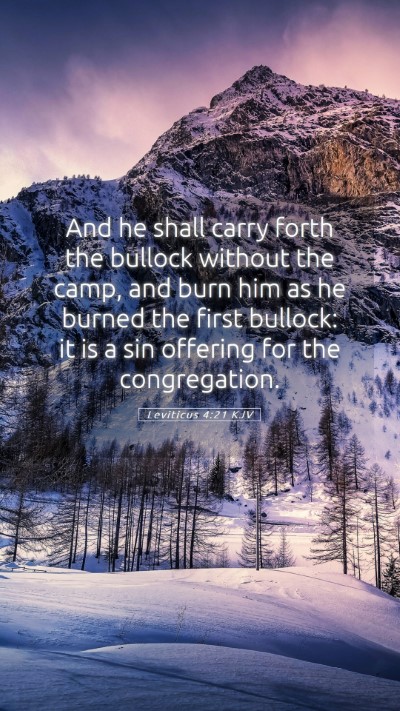Understanding Leviticus 4:21
Leviticus 4:21 states: "And he shall carry forth the bullock without the camp, and burn him as he burned the first bullock: it is a sin offering for the congregation." This verse is situated within the broader context of the sacrificial system outlined in Leviticus.
Meaning of the Verse:
This scripture relates to the procedures for atonement for unintentional sins within the Israelite community. The act of taking the bull outside the camp symbolizes the removal of sin from the people and highlights the seriousness of sinning against God.
- The Symbolism of Sacrifice: According to both Matthew Henry and Adam Clarke, the sacrifice of the bull signifies the death of the sin itself. The bull, representing the congregation's guilt, is burned outside the camp, pointing metaphorically to the necessity of total removal of sin.
- Significance of Atonement: Albert Barnes emphasizes that this ritual acts not just as a physical act but as a crucial spiritual lesson for the Israelites: the seriousness of sin and the care that must be taken in restoring one’s relationship with God.
- The Role of the Priest: The priest, as the mediator, plays a vital role in the atonement process. This underscores the importance of leadership within the community when handling spiritual matters, as explained in various commentaries.
In-depth Bible Verse Analysis
This verse exemplifies key themes in Leviticus, such as holiness and the processes for atonement. The law provided in this chapter shows God’s commitment to purity among His people.
Application of Bible Verses
For modern readers, understanding the process of atonement in Leviticus can offer invaluable insights into biblical forgiveness and the necessity of confession in the Christian faith. The ritualistic nature of these laws illustrates how deeply intertwined faith and practice can be.
Connecting to New Testament Teachings
The sacrificial system detailed in Leviticus finds its fulfillment in Christ, as noted by many New Testament authors. Jesus' ultimate sacrifice as the Lamb of God (John 1:29) serves as a corrective and a completion to these ancient practices.
Related Bible Cross References:
- Hebrews 13:11-13 - Discusses the significance of sacrifices taken outside the camp.
- 1 Peter 2:24 - References Christ bearing our sins in His body on the tree.
- Isaiah 53:6 - Foretells the suffering of Christ for our transgressions.
Resources for Further Study
For those looking to deepen their understanding of this scripture, consider utilizing:
- Bible study tools - To explore the Hebrew language and cultural background.
- Online Bible study courses - Focused on Old Testament sacrificial practices.
- Bible study guides - That delve into the significance of the law in Christian faith.
Conclusion
Leviticus 4:21 offers profound insights into the nature of sin, the necessity of atonement, and foreshadows Christ's redemptive work. Understanding such scriptures aids in enriching one's personal faith journey and in facilitating deeper discussions in Bible study groups.


